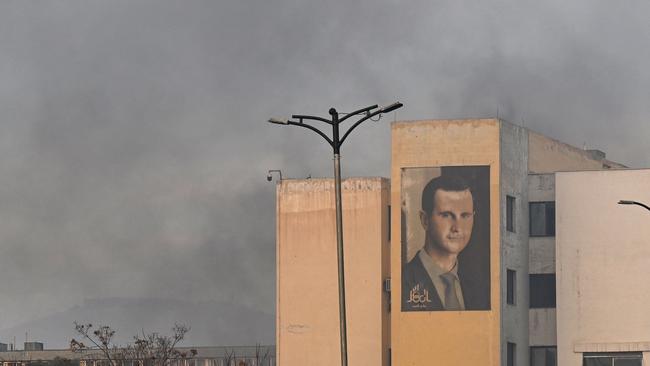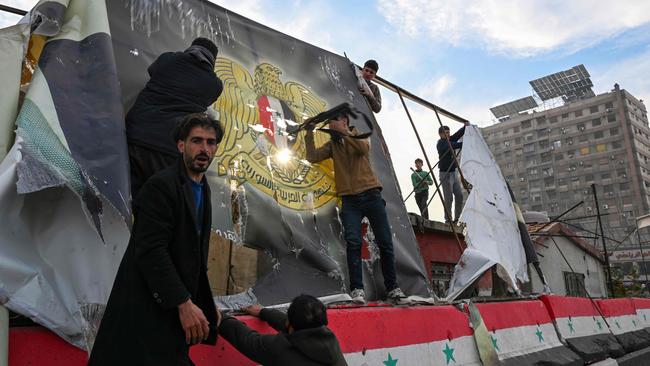Most Syrians will celebrate the fall of Bashar al-Assad, but chaos could take his place


Australia and the western world will welcome the demise of this ruthless dictator who was the definition of evil with his willingness to slaughter his own people, including using chemical weapons, during his country’s 2011-2018 civil war.
Some 300,000 civilians were killed in Assad’s brutal crackdown on the pro-democracy uprising during the Arab Spring from 2011, in a war which left the people of Syria divided and destitute. He was a butcher who will not be missed.
But the story of his remarkable toppling by a coalition of Islamist groups is not a simple case of good versus evil. The victorious rebels are led by the group Hayat Tahrir al-Sham, or HTS, who originated from al Qa’ida and, although they have since disavowed that group, are still designated by the US as a terrorist organisation.
This group, who were joined by an umbrella group of Turkish-backed Syrian militias called the Syrian National Army, has stunned the world, and most likely themselves, by sweeping through Syria from their small stronghold in the northwest to take the key cities of Aleppo, Homs and now the capital Damascus in just a matter of weeks.
They were able to do so because Assad and his government forces were effectively abandoned by the same three allies who saved Syria during its civil war: Russia, Hezbollah and Iran.
Each of these entities were now too busy fighting wars against democracies – Hezbollah and Iran against Israel, and Russia against Ukraine – to send troops and warplanes to Assad’s aid as they did during the civil war.

As such, when the well armed rebels began their advance, they encountered only minimal opposition from government forces who sometimes ran off.
Assad’s fate remains unknown, although he was reported to have fled the country shortly before the rebels entered Damascus. It ends 54 years of hardline Assad family rule that began with his father Hafez Assad in 1970.
But the demise of his regime changes the regional balance of power by greatly weakening the influence of Assad’s allies Russia, Hezbollah and Iran in Syria and therefore across the Middle East.
The critical question now will be what replaces Assad. HTS leader Abu Mohammed al-Jawlani claims that his Sunni group, which has an ideology blending Islamism and nationalism, is now a more moderate Islamic outfit, having broken with Islamic State in 2012 and cut ties with al Qa’ida in 2016. The group appears to have the tacit backing of regional powerhouse Turkey. After HTS forces took Aleppo, al-Jawlani took the unusual step of ordering the protection of Christians and Shi’ites, claiming ‘‘diversity is our strength not our weakness’’.
But no one knows how HTS might conduct itself now that it finds itself suddenly in control of all of the key cities in Syria or whether it has the ability to govern on a large scale.
It is also unclear whether the HTS is able to work in a power-sharing arrangement with the militias known as the Syrian National Army which fought this offensive alongside it.
To complicate the situation further much of Syria’s east is controlled by the Syrian Democratic Forces, a Kurdish-led group backed by the US that in the past has clashed with most other armed groups in the country and is hated by Turkey. Around 1000 US troops are stationed in the east and the south of Syria, well away from the fighting but close enough to keep a close eye on developments.
From the US perspective, this Syrian conflict is basically a case of baddies versus baddies, and while Washington will be happy to see the end of Assad, its main concern will be to ensure that this transition of power does not lead to the establishment of a new Islamic State-style regime.
This overthrow of Assad has thrown up even more uncertainties for the Middle East in a region already roiled by the wars against Hamas in Gaza and Hezbollah in Lebanon. There is no certainty that Syria’s new powerbrokers will be good for Syrians, but there is no doubt that the dictator they have overthrown was a disaster for his own people and that his demise should be a cause for celebration and relief.





The fall of the murderous regime of Bashar al-Assad in Syria is a stunning development which recasts the balance of power in the Middle East while throwing the region into even greater chaos.